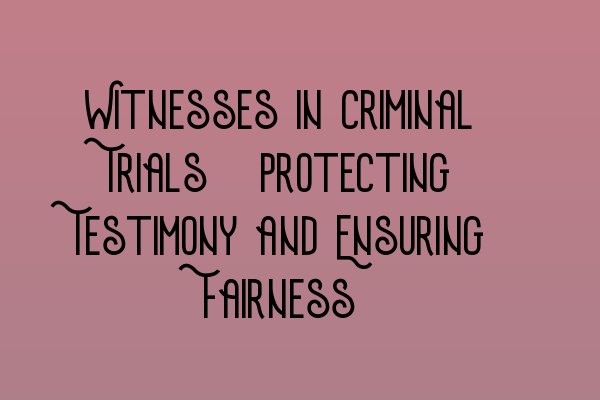Witnesses in Criminal Trials: Protecting Testimony and Ensuring Fairness
Welcome to the SQE Criminal Law & Practice Law UK blog! In this article, we will explore the crucial role of witnesses in criminal trials, focusing on how their testimony is protected, and the measures taken to ensure fairness during the trial process. Witnesses play a pivotal role in establishing the facts and determining the guilt or innocence of a defendant. It is essential that their testimony is treated with utmost care and consideration to uphold the principles of justice.
Why Protecting Witnesses is Vital
Protecting witnesses is vital for several reasons. First and foremost, witnesses may possess key information that is crucial to proving or disproving the allegations against a defendant. Their testimony can provide invaluable insights into the events surrounding the alleged crime, potentially influencing the outcome of the trial.
Furthermore, witnesses may be reluctant to come forward or testify due to fear of retaliation or intimidation. It is the duty of the criminal justice system to ensure their safety and provide necessary protections. By safeguarding witnesses, we encourage a sense of security and promote a culture of accountability.
Measures to Protect Witnesses
In the UK, there are several measures in place to protect witnesses and their testimonies:
- Anonymity Orders: In certain cases, witnesses may be granted anonymity orders to prevent their identities from being disclosed publicly. This safeguard helps mitigate potential risks and ensures witnesses feel comfortable providing their testimonies without fear of reprisal.
- Witness Protection Program: For particularly vulnerable witnesses, such as those at risk of serious harm, the witness protection program offers relocation, new identities, and ongoing support to ensure their safety.
- Restrictions on Cross-Examination: In some instances, restrictions may be applied to cross-examination to protect vulnerable witnesses, prevent harassment, or avoid unnecessary disclosure of private or sensitive information.
These measures aim to strike a balance between protecting witnesses and maintaining a fair trial process.
Ensuring Fairness in Testimony
Fairness is of utmost importance in criminal trials. It is essential that witnesses provide accurate and reliable testimony, free from manipulation or coercion. To ensure fairness, the following practices are implemented:
- Competence and Compellability: Witnesses must possess the necessary competence to give evidence and be compelled to attend court and testify truthfully. However, certain exceptions exist to protect vulnerable or incapacitated individuals from giving evidence.
- Witness Preparation: Witnesses may receive guidance and support to help them navigate the trial process. This can include providing information on court procedures, explaining legal terms, and conducting mock examinations to prepare witnesses for questioning.
- Admissible Evidence: The court carefully scrutinizes the admissibility of evidence to ensure that only relevant and reliable information is presented. This helps prevent unfair or prejudicial evidence from influencing the jury’s decision.
These practices help maintain the integrity of witnesses’ testimony and promote fairness throughout the trial.
Conclusion
Witnesses are the backbone of the criminal justice system, providing critical information that can shape the outcome of criminal trials. Protecting their testimony and ensuring fairness is essential for upholding the principles of justice.
At SQE Criminal Law & Practice Law UK, we are committed to promoting knowledge and understanding within the legal community. If you’re interested in expanding your expertise in criminal practice, you may want to check out our related articles:
- Workshops and Seminars on Criminal Practice: Expanding Your Expertise
- Updates in UK Criminal Laws: Staying Informed and Prepared
- Enhancing Your SQE Criminal Law Study Group Experience
- Decoding Criminal Evidence Rules: A Detailed Analysis
- Ensuring Rights of Victims in Criminal Procedures: Legal Protections and Support
We hope you found this article informative and valuable. Feel free to explore our website for more resources and contact us if you have any further questions or inquiries.
